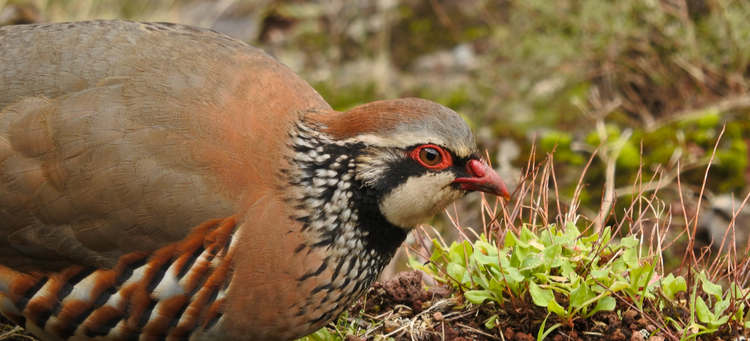
The Birds of “The 12 Days of Christmas”
It may not be the catchiest Christmas song (it’s certainly not my favorite), but “The 12 Days of Christmas” is almost certainly the longest. Nearly two weeks of holiday presents makes for pages of lyrics and a tune that’s exhausting for carolers everywhere.
For bird enthusiasts, however, the song sticks out for another reason. In addition to lords, pipers, and golden rings, the song’s repetitive lyrics mention six different varieties of birds. While they wouldn’t make great pets, they would still make for an impressive gift centuries after the song’s first publication.
A Partridge In A Pear Tree
According to Michigan State University’s Pam Rasmussen, the song’s most famous lyrics probably refer to the red-legged partridge. The noted ornithologist remarks that the game bird was brought to England in the late 18th century, right around the time the carol was written. Today, they’re ubiquitous throughout the United Kingdom.
Enjoying pears this holiday season? Feel free to share some bite-sized pieces with your dog or cat. In moderation, the fruit provides a healthy dose of minerals like copper and vitamin K. Keep pets away from pits and seeds (which contain trace amounts of a dangerous toxin) and steer clear of sugary canned fruits or fatty pear-based desserts.
Two Turtle Doves
Despite the name, there’s nothing reptilian about the turtle dove. They are named, Rasmussen notes, after their unique call, “turr turr.” The birds were plentiful when “The 12 Days of Christmas” first appeared. Both hunting and habitat loss have driven down their numbers in the years since.
Though turtle doves aren’t meant to be domesticated (it’s illegal to own them in Europe), several varieties of doves make great pets. The domestic ring-necked dove is the most popular among these and generally considered the easiest to keep.
Three French Hens
It’s unclear whether the lyrics refer to one specific type of chicken or another. Around 40 distinct breeds of domestic chicken have roots in France. As Rasmussen writes, they’re all variants of the red junglefowl, which originated in Asia and is now the most abundant bird on the planet.
Chickens have become a newly-popular pet in the age of COVID-19. Across the country, stay-at-home orders have inspired many amateur farmers to build backyard chicken coops. The Farmers’ Almanac notes that, depending on the breed, a productive trio of hens could lay nearly a thousand eggs a year. That’s a gift that keeps on giving!
Four Calling Birds
While contemporary versions of “The 12 Days of Christmas” make reference to “calling birds,” earlier lyrics describe the gift differently. The song initially lists four “colly birds” and subsequent versions would change the spelling to “colley” and “collie” before evolving to today’s lyric.
“Colly” is an Old English word for black and Rasmussen’s best guess is that “colly bird” refers to the Eurasian blackbird. She suggests that the term “calling bird” could refer to almost any of the U.K.’s numerous songbirds.
Six Geese-a-Laying
Greylag geese were popular when “The 12 Days of Christmas” was written and Rasmussen writes that they are the ancestors of many modern breeds. While the U.K. counts several types of geese among its fauna, the greylag is the only one that is commonly kept on the farm. They’re most familiar today for their distinct honking call.
A domestic goose won’t lay quite as many eggs as a hen, but six could still provide around 120 each year.
Seven Swans-a-Swimming
The turtle dove isn’t the only bird in the song with a misleading name. Mute swans — the most common of England’s several breeds — aren’t actually silent. Rasmussen explains that the loud sound of their flapping wings helps them to communicate with other birds in flight. Over the years, they’ve been introduced to the United States and are now populous enough to be considered an invasive species in Michigan.
Caring for Birds All Year Round
Whether or not your true love is gifting you with a bird (or several) this year, PetPlace has the insights you need to keep them happy and healthy for many new years to come. Check out some of our resources for new bird owners: